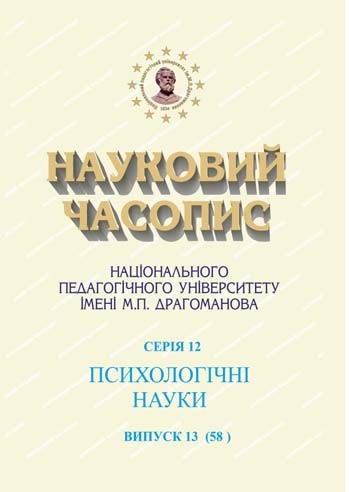PSYCHOLOGICAL STUDY OF EDUCATIONAL AND PROFESSIONAL MOTIVATION OF FUTURE TEACHERS
DOI:
https://doi.org/10.31392/NPU-nc.series12.2021.13(58).05Keywords:
motivation, students, educational motivation, professional motivation, educational and professional activity, formation of positive motivationAbstract
The main aspects of motivation as a psychological and pedagogical phenomenon are considered in the article. The conditions influencing the formation of positive motives of educational activity and methods of increasing students' motivation to study are analyzed. A questionnaire was conducted and the results of a study of educational and professional motivation of future teachers were described. The goal of the article is to analyze the problem of formation and demonstration of current educational and professional motivation of future teachers to increase the level of training of modern specialists on a specialty 015 Professional Education (Technology of light industry products) in the context of successful competitive professional activity. A set of theoretical and empirical methods was used, which included analysis, synthesis, systematization, comparison and generalization of data on the problem of educational and professional motivation of students, “Methods for diagnosing the learning motivation of students” (A. Rean, V. Yakunin), “Motivation of higher education” (T. Ilyina), questionnaires, surveys and methods of mathematical statistics. According to the results of the study, it is determined that the vast majority of participants are satisfied with the methods of teaching and studying psychological and pedagogical disciplines and disciplines of the technical cycle. The data of the analysis show that modern youth understands the importance of higher education today. In most respondents, the leading motives for learning are cognitive and professional. The analysis of the survey showed that, first of all, the most significant motives of educational activity included the following motives: to become a highly qualified specialist (80% of students); to acquire deep and stable knowledge (70% of students); to get intellectual pleasure (70% of students); to ensure the success of future professional activities (63.3% of students). The choice of such motives indicates the presence of cognitive interest in the structure of internal motivation, which is very important in the implementation of educational activities. The high professional level of teachers and their partnership with students have a positive effect on internal motivation. After graduation the majority of future teachers intend to look for a job in the specialty, however, the level of salary and the desire to have their own business are the most important criteria. As a positive trend we can highlight the fact that 50% of respondents look to the future calmly but without much illusion and 40% – with hope and optimism. The development of professional motivation of students in higher education institutions is an essential task for increasing the level of training of modern specialists for successful competitive professional activity in the world labor market, it is advisable to create a system of psychological support for future professionals to identify key issues related to the initial stage of carreer of future professionals and to promote their positive solution.
References
- Hurtovenko, N. (2017). Kryterii otsinky, pokaznyky ta rivni psykholohichnoi hotovnosti maibutnikh pedahohiv do profesiinoi samorealizatsii. [Evaluation criteria, indicators and levels of psychological readiness of future teachers for professional self-realization]. Psykholohichnyy chasopys – Psychological Journal, 3(4), 53–65. https://doi.org/10.31108/1.2017.4.8.5 [in Ukrainian].
- Dognal, Jozef. (2017). Motivacija studentov k obucheniju i ee bar'ery (jesse, osnovannoe na opyte obuchenija inostrannym jazykam). [Motivation of university students (essay based on the experience of teaching foreign languages)]. Retrieved from https://www.meteor-city.top/motivacia-studentov-i-ee-baryery [in Russian].
- Zanyuk, S.S. (2001). Psihologiya motivatsii: Teoriya i praktika motivirovaniya. Motivatsionnyiy trening. [Psychology of Motivation: Theory and Practice of Motivation. Motivational training.]. Kyiv : Elga-N, Nika-Tsentr [in Russian].
- Yerokhin, S.A., Nikitin, Yu.V., & Nikitina, I.V. (2011). Kontseptsiia profesiinoi motyvatsii studentiv yak faktor konkurentnosti na rynku pratsi. [The concept of professional motivation of students as a factor of competitiveness in the labor market]. Yurydychna nauka – Legal science,1, 20–28 [in Ukrainian].
- Matveieva, N. (2017). Osoblyvosti pidvyshchennia yakosti profesiinoi pidhotovky maibutnikh pedahohiv na suchasnomu etapi. [Features of improving the quality of professional training of future teachers at the present stage]. Osvitnii prostir Ukrainy – Educational space of Ukraine, 9, 96–102. https://doi.org/10.15330/esu.9.96-102 [in Ukrainian].
- Pinska, (2009). Profesiina motyvatsiia yak zasib pidvyshchennia efektyvnosti navchalnoi diialnosti studentiv. [Professional motivation as a means of improving the efficiency of students' learning activities]. Problemy trudovoi i profesiinoi pidhotovky – Problems of labor and professional training, 14, 111–115 [in Ukrainian].
- Skoryk, T.V. (2020). Monitorynhove doslidzhennia rozvytku profesiinoi uspishnosti maibutnikh uchyteliv. Pedahohichnyi almanakh – Pedagogical Almanac, 46, 208–214. https://doi.org/10.37915/pa.vi46.129 [in Ukrainian].
- Tovkanets, H., Avsheniuk, N., Boksha, N., Bryzhak, N., Horvat, M., Kotun, K., et al. (2018). Pedahohichna osvita i profesiina pidhotovka v suchasnomu sotsiokulturnomu seredovyshchi [Pedagogical education and professional training in the modern socio-cultural environment]. Mukachevo : Redaktsiino-vydavnychyi tsentr MDU [in Ukrainian].
- Cherniak,O. (2013). Formuvannia motyvatsii studentiv do navchannia u VNZ. [Formation of students' motivation to study at the university]. Problemy inzhenerno-pedahohichnoi osvity – Problems of engineering and pedagogical education, 38–39, 388–393 [in Ukrainian].
- Seifert, Tim. (2004). Understanding student motivation. Educational Research, 46, 137–149. https://doi.org/10.1080/0013188042000222421.
- Wijnia, L., & Servant-Miklos,F.C (2019). Lagging behind the Times: A Brief History of Motivational Discourse in Problem Learning. Advances in Health Sciences Education, 24, 915–929. https://doi.org/10.1007/s10459-019-09923-3

